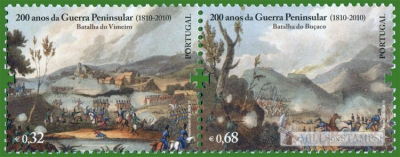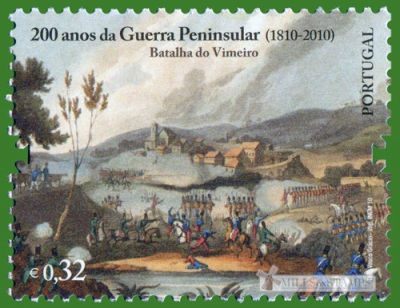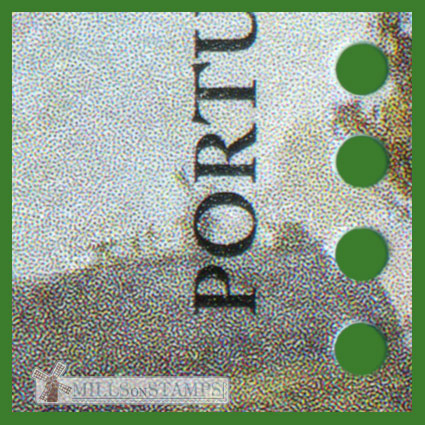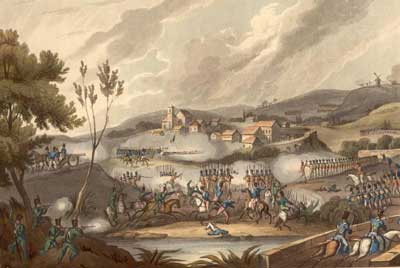-


Perforation type: 12 ¼x12
Subject:
32 cents. Battle in Vimeiro*
Under the letter "O" in the word PORTUGAL can see the windmill (see the fragment and reproductions of ancient engraving)Additional:
*Vimeiro is a freguesia (civil parish) in the municipality of Lourinhã in west-central Portugal. It is in the District of Lisboa. It has an area of approximately 7 km² and a population of 1,443 as of 2001.
Vimeiro was the site of the 1808 Battle of Vimeiro (part of Peninsular War)**, where British forces under the Duke of Wellington defeated the French, ending the first French invasion of Portugal.The Peninsular War was a war between France and the allied powers of Spain, the United Kingdom, and Portugal for control of the Iberian Peninsula during the Napoleonic Wars. The war began when French armies crossed Spain and invaded Portugal in 1807 and then in 1808 turned on its ally, Spain. The war lasted until the Sixth Coalition defeated Napoleon in 1814.
Spain's liberation struggle marked one of the first national wars and the emergence of large-scale guerrillas (Guerrilha, in Portuguese), from which the English language borrowed the word. The French occupation destroyed the Spanish administration, which fragmented into quarrelling provincial juntas. In 1810, a reconstituted national government fortified itself in Cádiz and proved unable to recruit, train, or equip effective armies due to being under siege. British and Portuguese forces secured Portugal, using it as a secure position from which to launch campaigns against the French army while Spanish guerrilleros bled the occupiers. Combined, the regular and irregular allied forces prevented Napoleon's marshals from subduing the rebellious Spanish provinces.
The many years of fighting in Spain gradually wore down Napoleon's famous French Army. While the French armies were often victorious in battle, their communications and supplies were severely tested and their units frequently cut off, harassed, or overwhelmed by partisans. The Spanish army, though beaten and driven to the peripheries, could not be stamped out and continued to hound the French relentlessly.
The constant threatening presence of a British force under Arthur Wellesley, which became the most experienced and steady force in the British army, guarded Portugal and campaigned against the French in Spain alongside the reformed Portuguese army. Allied to the British, the demoralised Portuguese army underwent extensive reorganising, retraining and refitting under the command of British General William Carr Beresford, appointed commander-in-chief of the Portuguese forces by the exiled Portugese Royal family, and fought as part of a combined Anglo-Portuguese army under Wellington.
In 1812, as Napoleon embarked upon an invasion of Russia which ended in disaster, a combined allied army under Arthur Wellesley pushed into Spain and liberated Madrid. Marshal Soult led the exhausted and demoralized French forces in a fighting withdrawal across the Pyrenees and into France over the winter of 1813-14.
War and revolution against Napoleon's occupation led to the Spanish Constitution of 1812, later a cornerstone of European liberalism. The burden of war destroyed the social and economic fabric of Portugal and Spain and ushered in an era of social turbulence, political instability, and economic stagnation. Devastating civil wars between liberal and absolutist factions, led by officers trained in the Peninsular War, persisted in Iberia until 1850. The cumulative crises and disruptions of invasion, revolution, and restoration led to the independence of many of Spain's American colonies and the independence of Brazil from Portugal.__________
This information has been taken from Wikipedia
Fragment of the stamp with a windmill:

Reproduction of ancient engraving:

200 years of Peninsular War
Portugal 2010.09.15
In issue: Stamp(s): 2 Souvenir sheet(s): 1